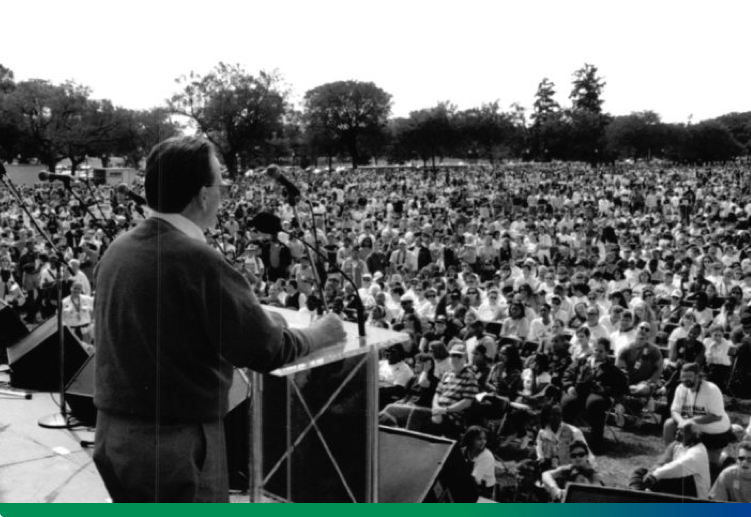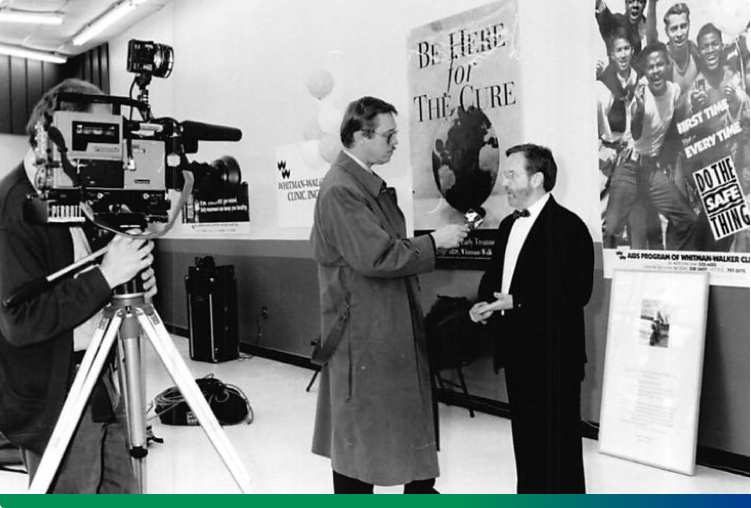As part of Whitman-Walker’s 40th anniversary, officially January 13, 2018, we’re sharing 40 stories to help tell the narrative of Whitman-Walker in community. Please join us in recognizing, and reflecting upon, the life of Jim Graham. Jim Graham served as the first Executive Director of Whitman-Walker Health and saw the clinic through the early days of the AIDS epidemic.
Jim was a pioneer of LGBTQ health and community-focused policy in DC. During a time when people and institutions shut their doors to those in need, Jim paved the way for the compassion that grounds Whitman-Walker’s healthcare today. His memory will be uplifted for years to come – may he rest in power.
Click the orange play button below to hear Jim’s July 17, 2001 oral history – a recorded interview with an individual having personal knowledge of past events. Thank you to the Rainbow History Project for sharing Jim’s story. Scroll down further for quotes from his oral history and photos of Jim throughout the years.
Photo: Jim Graham speaking at the 1998 National AIDS Candlelight Vigil.
Five Quotes from Jim’s Oral History
On Working with Whitman-Walker in the Early 1980s:
“The point is that we were planning for something that still hadn’t touched our lives. Which I saw it as something really significant because we were ahead of what would be a tidal wave. And much of the advantage of what we were able to subsequently do. The fact that we were out of the gate so quickly and competently, really mattered later on.”
On the reaction from the gay community:
“So, what was the reaction from the gay community? The reaction from those two things was it was very, very responsive, from the beginning. But once we got through that first stage, there was a reaction which said, you know, ‘You’re puritans, this is not as serious as you think it is.’ I remember Frank Kameny saying to me that the history – that AIDS would be a blip in the history of the gay movement. And you know, people who – and Frank was very much part of this – who really believed that multiple sexual partners, etc., and all of what was involved there, was a birthright of the gay community. We ran into that very quickly. It was reinforced by the bathhouse owners, it was reinforced by the gay bar owners, who took an attitude that, ‘You’re the skunk at the garden party, you’re raining on our fun.’ You know, kind of thing. And that was an obstacle. As soon as we got through the first stage, and we had a lot of that. Here and everywhere else. And I don’t know that we skillfully handled it or not. In hindsight, I don’t know whether we did handle it very well. Because what we saw were increasing signs that this was, you know, gonna be a massive problem.”

Jim Graham speaking in 1997.
On providing end-of-life legal counsel & the beginning of Whitman-Walker Legal Services:
“And I remember very distinctly that on 34 different occasions, I went to the bedside of people who were dying, you know, in the final hours and days, just to try to straighten out their legal affairs. On 34 occasions, 34 people I did this for. And then I have a total client load of over 100 in the time I did this. I did it for almost 18 months. And this carried me, in addition to the daily stuff that I was doing, this carried me right into the trenches of the epidemic. And created the whole experience of the epidemic for me.”
“but going to the bedsides, I still can remember, vividly, you know, people spitting in your face. Not wittingly, but just the horrible circumstances because the people, the wills that I was dealing with were very poor people, who this was an important step for them in their, putting their life together with powers of attorney and the – just all of those issues. You know? So anyway, that – and then parents showing up and being introduced to their lover and all of those dynamics I witnessed firsthand and was part of firsthand. And it was an extremely emotional time. So, I was very, very happy when we hired our first lawyer, who I turned all of this over to. And I’m sure they were much more confidently served, and I was out of that. And it was an enormous relief. And that was by 1986, which was the beginning of the clinic’s legal program.”

Tom Sherwood, of NBC4, interviewing Jim Graham.
On the historic impact of Whitman-Walker and its response:
“And Whitman-Walker, even though I didn’t – I really can’t say that I ever thought I was part of anything historic, when it was happening, you know? Something motivated me to preserve it, you know, what was going on.”
“…We had the major epidemic of the 20th century. And one of the greatest epidemics of all time. And this was the history of it. It was the history of a community banding together, and helping itself, I mean, which is a phenomenal story. We had so little – I mean, in the first two or three years, we were so fortunate to be in DC.”
On the interview series with Ray Engebretsen by Lisa M. Keen for the Washington Blade:
“It was ’85, early ’85. And she [Lisa M. Keen] followed him [Ray Engebretsen] to his death. But when that, when the first of those articles appeared, showing this strapping, handsome, blonde biker next to his Harley or whatever it was, and then in contrast to what he looked like at that time, and he would die within a few months of those articles – that – just those two pictures were very impactful. We knew it would be.”
“‘It has increased the awareness of AIDS, the need to use proper preventive techniques as much as any other single event in Washington, in my opinion,’said Jim Graham, administrator of the Whitman-Walker health clinic, which serves the homosexual community. Graham introduced Engebretsen to Keen after she told him she wanted to follow an AIDS patient in the pages of The Blade.”
Read Ray Engebretsen’s second Washington Blade interview with Lisa Keen titled “You didn’t talk about it in polite company” here.
Reflecting on Jim’s Legacy
“Jim Graham courageously led Whitman-Walker Clinic (now Whitman-Walker Health) through the darkest hours of the AIDS epidemic in Washington, D.C., during the 1980s and 1990s. He fought valiantly for others in the face of adversity and death. He crusaded for causes big and small that aided those most in need. He did so with a powerful life force fueled by his amazing intellect, boundless energy, and artful creativity. He was not just trying to end AIDS. He sought to eradicate injustice, discrimination, stigma, and inequality in our community. And he would expect — dare I say demand — that each one of us continue this quest of full equality and justice for all.”

-Don Blanchon, Executive Director at Whitman-Walker Health, Washington Blade, June 2017


